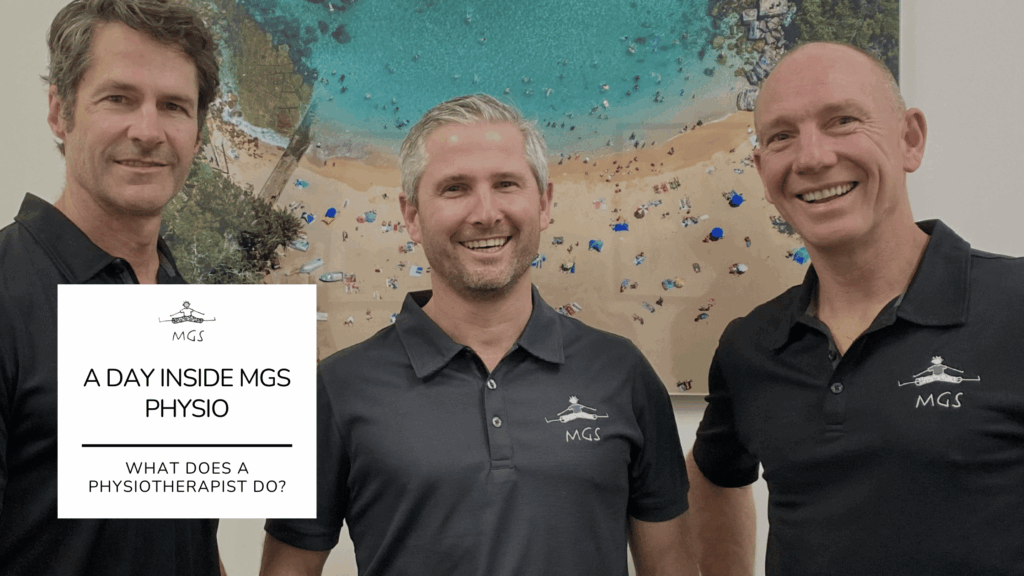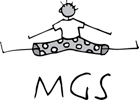Physiotherapists are often thought of as the people you go to after an injury, but their role extends much further. At MGS Physiotherapy, based across Sydney’s Northern Beaches, our physiotherapists spend their days helping patients manage pain, recover from injuries, improve mobility, and prevent future problems. They are highly trained health care professionals who understand the science of physical movement and how it affects the body at every stage of life.
It is important to note that physiotherapy plays a significant role in improving overall well-being, addressing not just physical health, but also emotional and social aspects.
In Australia, physiotherapists are registered with the Physiotherapy Board and recognised by the Australian Physiotherapy Association (APA). (In Australia, physiotherapists are often called “physios.”) These organisations ensure physiotherapists meet strict professional standards so that patients always receive safe, effective, and evidence-based healthcare. The Australian Physiotherapy Association can also help you find a qualified physiotherapist in your area.
So, what does a physiotherapist actually do on a typical day, and what can you expect if you visit MGS Physio?
Key Takeaways
- A physiotherapist helps with pain relief, recovery, and prevention of injuries.
- Sessions often include hands-on physical therapy, tailored exercises, and education.
- Physiotherapists don’t just treat injuries; they also provide preventative care for long-term health and wellness.
- Physiotherapists work to restore or enhance a patient’s ability to perform daily activities and improve overall functional capabilities.
- At MGS Physiotherapy, care is patient-centred, evidence-based, and tailored to each individual.
- Early intervention leads to faster recovery, better function, and improved quality of life.
Introduction to Physiotherapy
Physiotherapy – often called physical therapy – is a cornerstone of modern healthcare. It’s about helping people move better, recover from injury or illness, and live healthier lives. Physiotherapists work with patients of all ages to restore function, improve movement, and support overall wellness.
The practice of physiotherapy goes well beyond treating injuries. It includes targeted exercises, hands-on rehabilitation, massage, and education – all designed to restore mobility and improve quality of life. Physiotherapists develop customised programs to enhance specific movements that are essential for recovery and ongoing health. Whether you’re recovering from surgery, managing a chronic condition, or simply wanting to move more freely, physiotherapy offers proven pathways to better health.
Role of a Physiotherapist
A physiotherapist is a key player in the healthcare system, dedicated to helping patients manage pain, improve movement, and enhance their overall quality of life. Physiotherapists are highly trained professionals who assess, diagnose, and treat a wide range of conditions that can affect physical movement and function. Whether it’s a chronic condition like arthritis, a recent injury, or an illness that impacts mobility, physiotherapists work closely with patients to develop tailored treatment plans that address their unique needs.
One of the core responsibilities of a physiotherapist is to create personalised exercise programs that not only support recovery but also help prevent future injuries. Education is a big part of their role-physiotherapists empower patients with the knowledge and skills needed to maintain good health and make positive lifestyle changes. They are also qualified to perform and interpret various tests, including X-rays and other imaging, to assist in accurate diagnosis and effective treatment planning.
In Australia, physiotherapists must be registered with the Physiotherapy Board and adhere to the high standards set by the Australian Physiotherapy Association. This ensures that every patient receives safe, evidence-based care from a qualified professional. By focusing on improving movement, managing pain, and restoring function, physiotherapists make a real difference in the lives of their patients, helping them return to the activities they love and enjoy a better quality of life.
Starting the Day at MGS Physio
Before the first patient arrives, our physiotherapists prepare. They review notes, update each patient’s treatment plan, and set up equipment for upcoming sessions. They also review patient records and previous assessments to tailor each session to the individual’s needs. Some patients may be in the early stages of post-operative rehabilitation, while others are managing long-term chronic conditions such as arthritis.
This preparation is guided by both clinical practice experience and the latest research in sports medicine and physical therapy, ensuring every patient receives tailored, evidence-based care.
The Assessment Process
Every appointment begins with a conversation. A physiotherapist asks about your symptoms, lifestyle, activities, and any past injury or illness that might still affect your movement. You may be asked to bring medical notes, scans, or X-rays from your doctor to support an accurate diagnosis. Some patients are referred to physiotherapy by their doctor or another healthcare provider as part of their treatment plan.
The physical exam follows, testing balance, strength, posture, and flexibility. Physiotherapists are trained to look beyond the immediate pain – for example, shoulder discomfort might actually come from poor spinal posture or weak stabilising muscles. By identifying the root cause, we create a holistic treatment plan that improves long-term function, not just short-term relief.
Treatment in Action
No two patients receive the same care. A physiotherapist works closely with each patient to develop and implement a personalised treatment plan tailored to their specific needs and goals. Treatment usually combines:
Hands-On Techniques
Manual therapy – such as massage, joint mobilisation, or specific hands-on techniques – helps reduce stiffness, ease pain, and restore healthy movement patterns.
Exercise & Rehabilitation
Exercise is at the heart of rehabilitation. Physiotherapists may use things like splints, crutches, or other aids to support recovery and rehabilitation. This might include gentle stretches for acute injuries or a progressive strengthening program for athletes returning to sport. These therapeutic exercises not only support healing but also build resilience, reducing the risk of recurrence.
Education & Postural Care
Education is crucial. Your physiotherapist may show you how to adjust your workstation, correct your lifting mechanics, or adopt healthier daily habits. These small changes improve overall health and mobility, while helping to prevent future injury.
Conditions Treated at MGS Physio
Physiotherapists treat a wide range of issues, including:
- Acute injuries such as ankle sprains, hamstring tears, and shoulder strains.
- Chronic conditions, including arthritis, back pain, and tendon problems.
- Rehabilitation after surgery, such as knee replacements or rotator cuff repairs.
- Workplace-related problems, such as neck stiffness or repetitive strain.
- Injury prevention and performance programs for athletes.
There are different types of physiotherapy, each focusing on specific needs. These include musculoskeletal physiotherapy for joint and muscle issues, neurological physiotherapy for conditions like stroke or Parkinson’s disease, pediatric physiotherapy for children, and sports physiotherapy for athletic injuries and performance.
At MGS Physio, our physical therapists support patients in achieving meaningful goals – whether that’s returning to competitive sport, enjoying gardening, or simply walking the dog without pain.
Physiotherapy Treatment Settings
Physiotherapists work across a variety of settings in Australia – from hospitals and community health centres to sports clubs and aged care facilities. At MGS Physio, our modern clinics in Manly, North Curl Curl, and Mona Vale provide a welcoming, supportive environment equipped for all aspects of treatment and rehabilitation.
The clinic setting matters. A comfortable, professional environment allows patients to focus on recovery, while access to equipment and expert staff ensures the highest quality of care. Combined with personalised attention, this creates the ideal foundation for achieving long-term health outcomes.
A Day in the Clinic
Here’s what a day inside MGS might look like:
- Morning: A teenage netballer with a sprained ankle receives an assessment, taping, and a graded exercise program.
- Midday: An office worker with chronic neck pain undergoes manual therapy and postural correction strategies.
- Afternoon: A patient post-knee surgery attends for guided rehabilitation and strengthening work.
- Evening: A marathon runner with shin splints follows a prevention-focused physical therapy plan.
Each case is unique, but the principle remains the same: patient-centred care that restores confidence and independence.
Preventative Care and Long-Term Outcomes
Physiotherapy isn’t only about fixing injuries. Preventive care is central to what we do. By correcting movement patterns, strengthening weaknesses, and improving flexibility, physiotherapists reduce the risk of recurring injury.
Examples include:
- A tradie with recurring back pain benefits from a core strengthening program.
- An older adult improves balance to reduce fall risk and maintain mobility.
- Athletes undergo screening to spot weaknesses before competition begins.
This focus on prevention leads to better long-term outcomes – greater independence, improved function, and enhanced quality of life.
Costs and Access
Do you need a referral to see a physiotherapist? The answer is no – patients can book directly with MGS. However, sometimes your doctor may refer you to physiotherapy as part of a coordinated care plan.
Some physiotherapy services may be covered under Medicare with a GP referral, while private health funds often contribute to treatment costs. To get the best outcome, bring along relevant X-rays or test results, so your physiotherapist can create a personalised and effective rehabilitation plan.
The Team Behind the Scenes
At MGS, physiotherapists collaborate with a multidisciplinary team that may include doctors, surgeons, and exercise physiologists. This teamwork ensures seamless healthcare, from initial diagnosis through to rehabilitation and long-term prevention.
Career as a Physical Therapist
Choosing a career as a physical therapist, or physiotherapist, is ideal for those passionate about making a positive impact on people’s health and well-being. To become a physiotherapist in Australia, you must earn a degree in physiotherapy from an accredited university, complete supervised clinical practice, and pass a national examination to demonstrate your skills and knowledge. Registration with the Physiotherapy Board is essential, ensuring that all practising physiotherapists meet strict professional and ethical standards.
Physiotherapists in Australia enjoy a diverse range of career opportunities. They can work in hospitals, private practices, community health centres, sports clinics, and rehabilitation facilities. Many physiotherapists are eligible for Medicare reimbursement, making their services accessible to a wide range of patients. With experience, physiotherapists can choose to specialise in areas such as sports physiotherapy, neurological rehabilitation, or paediatrics, allowing them to focus on specific patient groups or conditions.
The goal of physiotherapy is always to improve movement, manage pain, and support overall wellness. Physiotherapists play a vital role in helping patients regain mobility, recover from injuries, and manage chronic conditions, making a tangible difference in their patients’ lives. For those who are dedicated, compassionate, and eager to help others achieve their best possible health, a career in physiotherapy offers both professional fulfilment and the chance to contribute meaningfully to the community.
Why Choose MGS Physiotherapy?
- Evidence-based practice guided by the latest research.
- A holistic approach that goes beyond symptoms.
- Tailored care for every stage of life, from children to older adults.
- Focus on both acute recovery and chronic condition management.
- Convenient Northern Beaches locations: Manly, North Curl Curl, and Mona Vale.
Final Thoughts
So, what does a physiotherapist actually do? At MGS Physio, it’s about more than treating an injury. Our team combines science, compassion, and skill to treat patients, restore function, and support long-term health and wellness.
Whether you’re dealing with a chronic condition, recovering from surgery, or simply want to improve movement, our physiotherapists are here to help you live a fuller, more active life.
Call now to book your physiotherapy appointment with MGS Physiotherapy.

